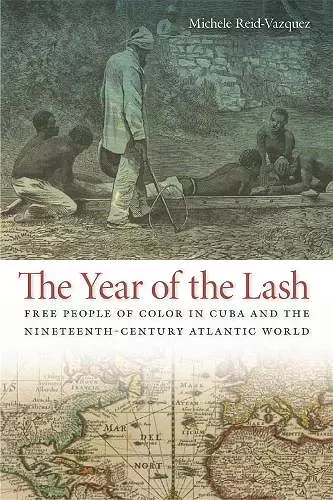The Year of the Lash
Free People of Color in Cuba and the Nineteenth-Century Atlantic World
Format:Hardback
Publisher:University of Georgia Press
Published:1st Nov '11
Currently unavailable, currently targeted to be due back around 24th January 2025, but could change

Michele Reid-Vazquez reveals the untold story of the strategies of negotiation used by free blacks in the aftermath of the “Year of the Lash”—a wave of repression in Cuba that had great implications for the Atlantic World in the next two decades.
At dawn on June 29, 1844, a firing squad in Havana executed ten accused ringleaders of the Conspiracy of La Escalera, an alleged plot to abolish slavery and colonial rule in Cuba. The condemned men represented prominent members of Cuba’s free community of African descent, including the acclaimed poet Plácido (Gabriel de la Concepción Valdés). In an effort to foster a white majority and curtail black rebellion, Spanish colonial authorities also banished, imprisoned, and exiled hundreds of free blacks, dismantled the militia of color, and accelerated white immigration projects.
Scholars have debated the existence of the Conspiracy of La Escalera for over a century, yet little is known about how those targeted by the violence responded. Drawing on archival material from Cuba, Mexico, Spain, and the United States, Reid-Vazquez provides a critical window into understanding how free people of color challenged colonial policies of terror and pursued justice on their own terms using formal and extralegal methods. Whether rooted in Cuba or cast into the Atlantic World, free men and women of African descent stretched and broke colonial expectations of their codes of conduct locally and in exile. Their actions underscored how black agency, albeit fragmented, worked to destabilize repression’s impact.
Reid-Vazquez sheds new light on the plight and resilience of Afro-Cuban exiles, and on the Atlantic anxieties triggered by the forced exodus of free people of color. Well written and rich in descriptive detail, her book is a significant contribution to the literature on Cuba and the African Diaspora in the Caribbean in the nineteenth century.
* author of Dangerous Speech: A Social History of Blasphemy in Colonial Mexico *Reid-Vazquez’s book signals a major accomplishment in deepening our knowledge of free-colored life in the Americas during the first half of the nineteenth century. Using Cuba as a focal point, and by revealing new aspects of black agency in the aftermath of the repressive Escalera Conspiracy, Reid-Vazquez opens tantalizing windows into black politics, military service, gender relations, imperial identity, Atlantic connections, and social formation processes in the years prior to independence. A 'must-read' for all interested in the Black Atlantic, The Year of the Lash demonstrates the need to take seriously the racial crucible of Latin America’s early national period, and its repercussions on the socio-political dynamics of lingering colonies like Cuba. Indeed, there is much to learn from this example for students of Cuba, Latin America, and the African Diaspora writ large.
* Herbert Baxter Adams Professor of Latin American History, Johns Hopkins University *[T]his book is a welcome addition to scholarship on race relations in late colonial Cuba. . . . Reid-Vazquez provides fresh insight into the experiences of free people of color during the Escalera era and raises stimulating questions for future research.
* The Americas *Throughout [The Year of the Lash], Reid-Vasquez draws upon rich research in several archives. . . . Reid-Vasquez effectively shows us how the responses to the reconfigured militia capture the situation of free people of colour in the mid-nineteenth century.
* Journal of Latin American Studies *When Reid-Vasquez turns her attention to labor migration from Spain, Yucatán, and China to Cuba (topics that have received a fair amount of attention by other scholars), she casts them in a new light. . . . This rich picture renders La Escalera as plenty eventful, despite and beyond persistent questions of what happened in 1844.
* Louisiana HistoISBN: 9780820335759
Dimensions: 229mm x 152mm x 19mm
Weight: 567g
208 pages